Mixing spices in your herbal tea elevates your beverage experience by enhancing flavor profiles and boosting health benefits. You'll enjoy a symphony of tastes, from the sweet warmth of cinnamon to the zesty kick of ginger. Cardamom adds complexity, while nutmeg offers comfort. Clove and star anise bring unique dimensions, and allspice contributes depth. Mint refreshes, lemon zest brightens, and rosemary invigorates. Beyond taste, these spices provide antioxidants, aid digestion, and support overall well-being. By experimenting with different combinations, you'll create personalized blends that cater to your palate and wellness goals. Discover the endless possibilities that await in your spice cabinet.
Cinnamon and Ginger Fusion
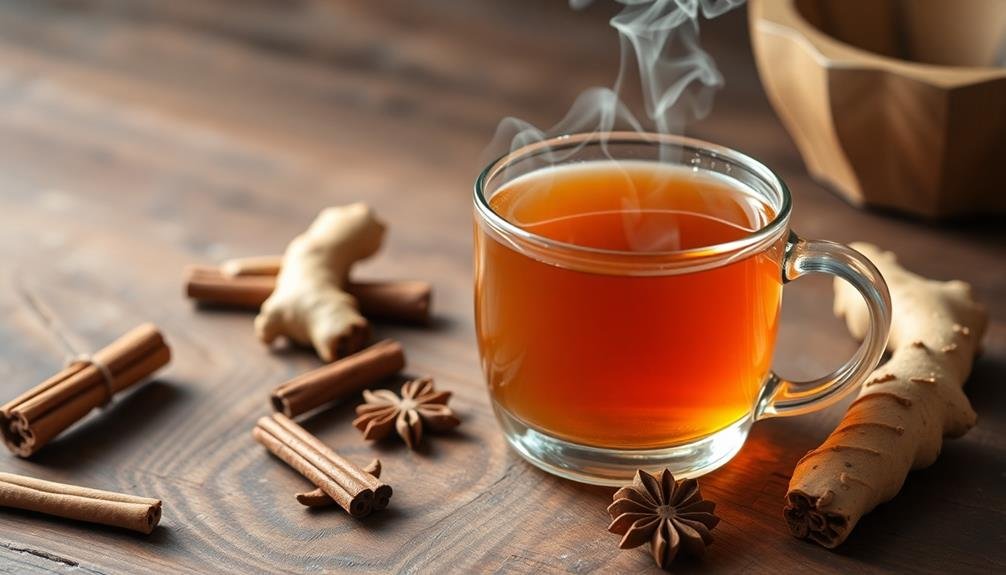
Two powerhouse spices come together in the cinnamon and ginger fusion. This dynamic duo offers a potent blend of flavors and health benefits that'll elevate your herbal tea experience.
Cinnamon brings a sweet, warm taste with hints of woodiness, while ginger adds a spicy, zesty kick. Together, they create a harmonious balance that tantalizes your taste buds.
You'll find this combination particularly comforting during colder months or when you're feeling under the weather. Both spices are known for their anti-inflammatory properties and ability to boost the immune system.
Cinnamon helps regulate blood sugar levels and may improve heart health, while ginger aids digestion and reduces nausea.
To create this fusion, simply add a cinnamon stick and a few slices of fresh ginger to your tea infuser along with your chosen herbal blend. Let it steep for 5-7 minutes, allowing the flavors to meld.
You can adjust the ratio of cinnamon to ginger based on your preference. For a stronger flavor, try using ground spices instead. Experiment with different herbal bases like chamomile, rooibos, or peppermint to find your perfect combination.
Cardamom's Aromatic Allure
While cinnamon and ginger offer a bold flavor combination, cardamom brings a unique and enchanting dimension to herbal teas. This aromatic spice, native to India and Sri Lanka, has a complex flavor profile that's both sweet and savory, with hints of mint and lemon.
When you add cardamom to your herbal tea, you're not just enhancing its taste but also boosting its health benefits. Cardamom is rich in antioxidants and has anti-inflammatory properties. It can aid digestion, freshen breath, and may even help lower blood pressure.
To incorporate cardamom into your tea, you can use either whole pods or ground seeds. For a subtle flavor, add one or two crushed pods to your tea infuser along with your chosen herbs. If you prefer a stronger taste, use ground cardamom, starting with 1/8 teaspoon per cup.
Cardamom pairs exceptionally well with chai spices, giving your tea a warm, exotic flavor. It's also delightful when combined with chamomile or mint teas, adding depth and sophistication to these classic blends.
Don't be afraid to experiment with different ratios to find your perfect cardamom-infused herbal tea.
Nutmeg's Warm Embrace
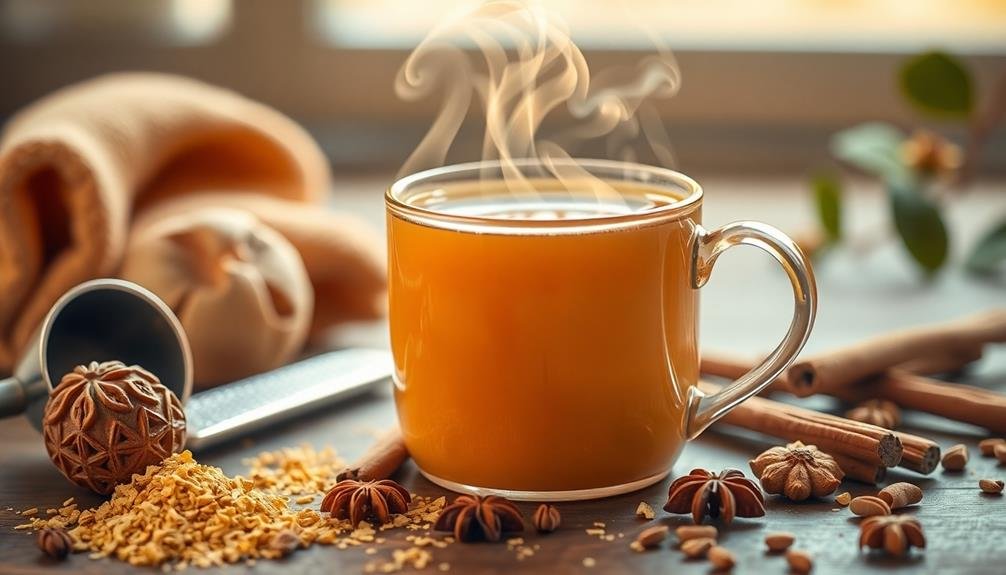
You'll find nutmeg's warm embrace adds a comforting layer to your herbal tea blend.
Its aromatic properties can transform your cup into a soothing experience, perfect for winding down after a long day.
Beyond its inviting scent, nutmeg offers potential digestive health benefits, making it a valuable addition to your tea repertoire.
Comforting Aromatic Properties
The aroma of nutmeg wafting from a steaming cup of herbal tea can instantly transport you to a cozy winter evening. This warm, slightly sweet spice offers more than just a pleasant scent; it envelops you in comfort and tranquility.
As you inhale the fragrant vapors, you'll notice the complex layers of nutmeg's aroma, from its initial woody notes to the subtle hints of clove and cinnamon.
Nutmeg's aromatic properties stimulate your olfactory senses, triggering a cascade of calming effects throughout your body. It's known to reduce stress and anxiety, helping you unwind after a long day.
The spice's natural compounds can also improve your mood and cognitive function, making it an ideal addition to your evening tea routine.
When you mix nutmeg with other herbs and spices in your tea, you'll create a symphony of aromas that work together to enhance your overall well-being.
Try combining it with chamomile for extra relaxation, or with ginger for a spicier kick. You'll find that nutmeg's versatile scent complements a wide range of herbal blends, adding depth and warmth to your tea experience.
Digestive Health Benefits
Sipping a warm cup of nutmeg-infused herbal tea, you're not just treating your taste buds and senses to a comforting experience; you're also nurturing your digestive system. Nutmeg contains compounds that stimulate digestive enzymes, promoting efficient breakdown of food and improved nutrient absorption. This aromatic spice can help alleviate common digestive issues like bloating, gas, and indigestion.
When you add nutmeg to your herbal tea, you're harnessing its carminative properties, which help reduce intestinal gas and soothe an upset stomach. It's particularly effective when combined with other digestive-friendly herbs like peppermint or ginger.
Nutmeg also boasts antimicrobial properties that can help maintain a healthy gut microbiome, essential for overall digestive health.
Regular consumption of nutmeg-infused tea may contribute to better appetite regulation and metabolism. Its mild laxative effect can aid in relieving constipation and promoting regular bowel movements.
Clove's Spicy Kick
Clove's distinctive spicy kick can elevate your herbal tea with its antioxidant-rich flavor.
You'll benefit from its potent antimicrobial properties, which can promote better dental health.
Antioxidant-Rich Flavor Boost
Packed with powerful antioxidants, cloves offer more than just a spicy kick to your herbal tea. They're a potent source of eugenol, a compound known for its antioxidant and anti-inflammatory properties. By adding cloves to your brew, you're not only enhancing the flavor but also boosting its health benefits.
When you mix cloves with other antioxidant-rich herbs like green tea or chamomile, you're creating a powerhouse beverage. These spices work synergistically, potentially increasing the overall antioxidant content of your drink. This combination can help combat free radicals in your body, which are linked to various chronic diseases and aging.
Cloves also contain manganese, a mineral that supports bone health and helps your body produce energy. By incorporating cloves into your herbal tea, you're getting a natural flavor enhancer and a nutrient boost.
Don't be afraid to experiment with different ratios to find your perfect blend. Remember, a little goes a long way with cloves, so start with a small amount and adjust to your taste preferences. You'll soon discover that this antioxidant-rich spice can transform your ordinary herbal tea into a flavorful and healthful beverage.
Antimicrobial Dental Benefits
Beyond its spicy flavor, clove-infused herbal tea offers surprising benefits for your dental health. Clove's active compound, eugenol, possesses potent antimicrobial properties that can help combat oral bacteria. When you sip clove tea, you're fundamentally giving your mouth a natural cleanse.
The antimicrobial action of clove extends beyond just fighting bacteria. It can also help reduce inflammation in your gums, potentially alleviating symptoms of gingivitis. Additionally, clove's analgesic properties can provide temporary relief from toothaches.
Here's a breakdown of clove's dental benefits:
| Benefit | How It Works | Additional Notes |
|---|---|---|
| Antibacterial | Eugenol kills oral bacteria | Helps prevent cavities |
| Anti-inflammatory | Reduces gum swelling | May improve gingivitis |
| Analgesic | Numbs pain receptors | Temporary toothache relief |
| Breath freshener | Masks odor-causing bacteria | Natural alternative to mints |
While clove tea isn't a substitute for proper dental hygiene, incorporating it into your routine can complement your oral care regimen. Remember to consult your dentist before relying on clove tea for dental issues, especially if you have existing oral health concerns or are taking medications.
Star Anise's Licorice Notes
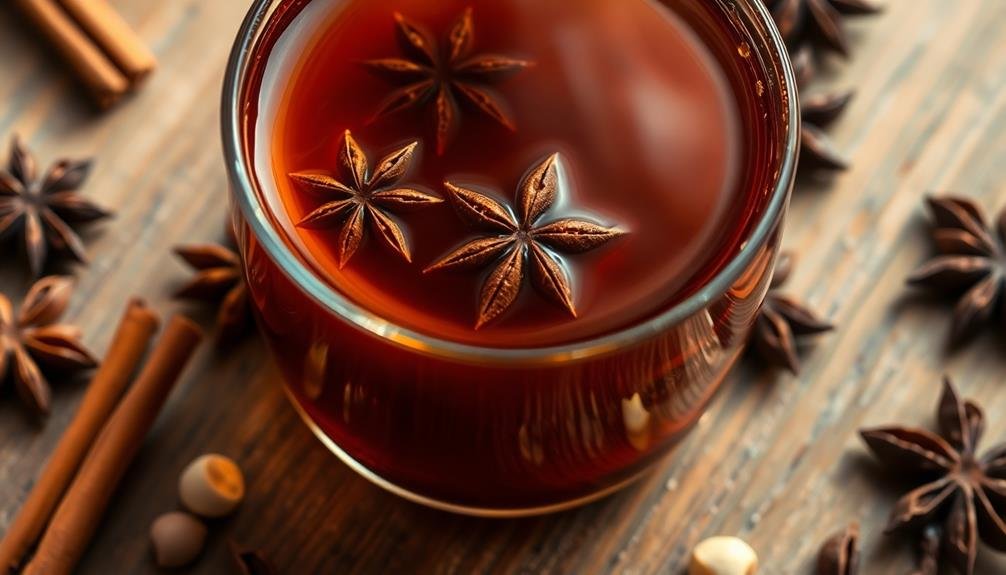
Star anise adds a distinctive licorice flavor to herbal tea blends. This star-shaped spice, native to Southeast Asia, brings a sweet and aromatic taste that can elevate your tea experience.
When you add star anise to your herbal infusions, you'll notice its intense licorice notes complementing other flavors.
You'll find that star anise pairs well with cinnamon, ginger, and citrus fruits in tea blends. Its unique flavor profile can balance out bitter herbs or enhance the sweetness of floral ingredients.
To use star anise in your tea, simply add one or two whole pods to your teapot or infuser. You can also crush the pods slightly to release more flavor.
Star anise isn't just about taste; it's also known for its potential health benefits. It contains compounds like anethole, which may have anti-inflammatory and antioxidant properties.
Some people use star anise tea to aid digestion or relieve respiratory issues. However, it's crucial to use it in moderation, as excessive consumption can lead to side effects.
When you're crafting your next herbal tea blend, consider incorporating star anise for its distinctive licorice notes and potential health benefits.
Turmeric's Golden Touch
With its vibrant golden hue and earthy flavor, turmeric brings a unique character to herbal tea blends. You'll find that this spice not only adds a rich color to your cup but also imparts a warm, slightly bitter taste that complements many other herbs and spices.
When you mix turmeric into your herbal tea, you're adding more than just flavor. This golden spice is renowned for its potential health benefits, particularly its anti-inflammatory and antioxidant properties. It contains curcumin, a compound that's been studied for its positive effects on various health conditions.
To get the most out of turmeric in your tea, pair it with black pepper. The piperine in black pepper enhances curcumin absorption, making the turmeric more effective.
You can also combine it with ginger for a spicy, warming blend that's perfect for cold days.
Black Pepper's Unexpected Twist
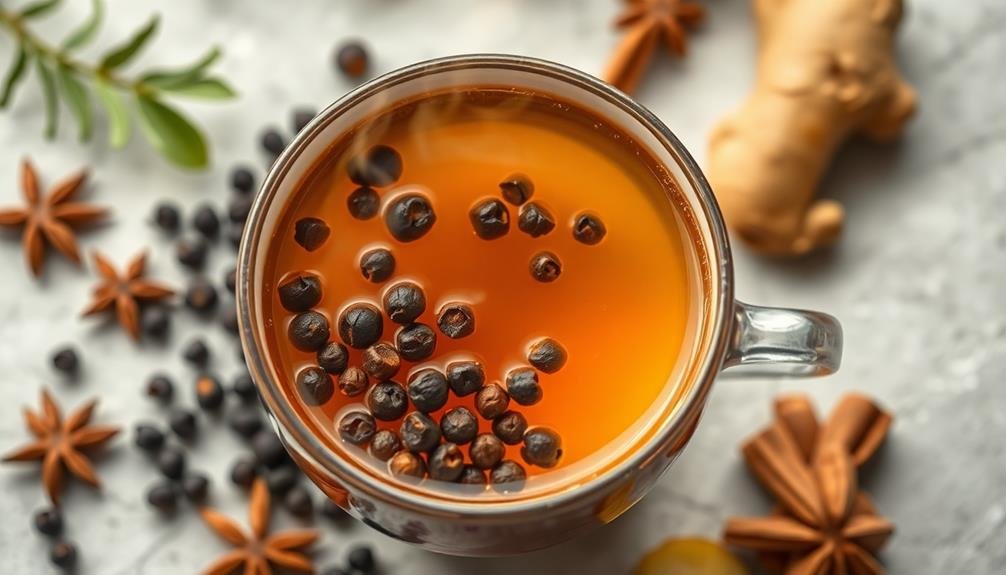
Despite its reputation as a savory spice, black pepper can add an unexpected twist to your herbal tea blends. This common kitchen staple brings more than just a pungent kick to your cup. Black pepper contains piperine, a compound that enhances the bioavailability of other nutrients, making it an excellent addition to your tea.
When you add a pinch of freshly ground black pepper to your herbal tea, you'll notice a subtle warmth and complexity in the flavor profile. It pairs exceptionally well with ginger, cinnamon, and turmeric, creating a harmonious balance of spices. The heat from black pepper can also help soothe a sore throat and clear congestion.
You'll find that black pepper's benefits extend beyond taste. It's known to aid digestion, boost metabolism, and even have anti-inflammatory properties. By incorporating it into your tea, you're not only enhancing the flavor but also reaping these health benefits.
Start with a small amount and adjust to your liking. Remember, a little goes a long way with this powerful spice. Don't be afraid to experiment and find your perfect blend.
Fennel's Subtle Sweetness
Fennel seeds bring a delicate, sweet anise-like flavor to herbal tea blends. You'll find that these tiny, ridged seeds add a unique dimension to your cup, offering a gentle sweetness that's both soothing and invigorating. When you're looking to balance stronger flavors or add a touch of complexity to your blend, fennel is an excellent choice.
You can steep fennel seeds alone for a simple, calming tea, or combine them with other herbs and spices for a more intricate flavor profile. They pair particularly well with mint, ginger, and chamomile. If you're dealing with digestive discomfort, fennel tea might provide some relief, as it's known for its potential to ease bloating and gas.
When adding fennel to your tea, start with a small amount – about half a teaspoon per cup. You can always adjust to taste. Crush the seeds slightly before steeping to release more of their essential oils and enhance the flavor.
Vanilla Bean's Comforting Presence
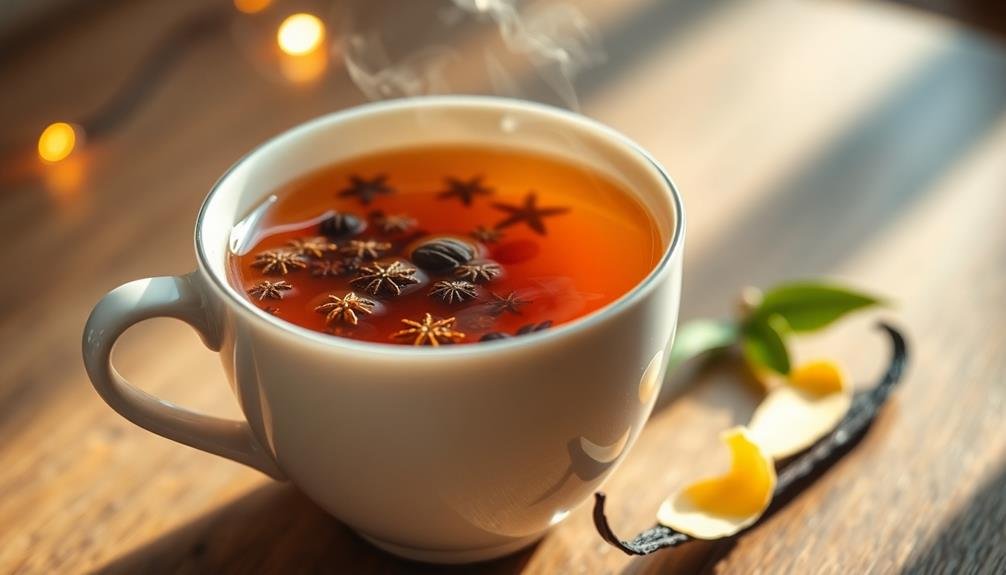
When you add vanilla bean to your herbal tea, you'll experience its soothing aromatherapy benefits instantly.
The warm, comforting scent enhances your tea's flavor while providing a gentle sweetness.
You'll also benefit from vanilla's stress-reducing properties, making it an excellent addition for a relaxing cup of tea.
Soothing Aromatherapy Benefits
The soothing aromatherapy benefits of vanilla bean in herbal tea can't be overstated. When you inhale the sweet, comforting aroma of vanilla, it triggers a cascade of positive effects on your mind and body. The scent molecules interact with your olfactory receptors, sending signals to your brain that can help reduce stress and anxiety.
Vanilla's calming properties extend beyond just its fragrance. As you sip your vanilla-infused herbal tea, you'll notice a gentle warming sensation that can help relax tense muscles and promote overall physical comfort. This natural relaxant can aid in improving your sleep quality, making it an excellent addition to your nighttime routine.
Moreover, vanilla's aromatherapy benefits can enhance your mood and cognitive function. The pleasant scent has been shown to boost feelings of happiness and contentment, potentially alleviating symptoms of mild depression.
It may also improve your focus and mental clarity, making it a great choice for a mid-afternoon pick-me-up.
Enhances Tea's Flavor
Beyond its aromatherapy benefits, vanilla bean's comforting presence enhances the flavor of herbal tea in remarkable ways. You'll find that adding a touch of vanilla to your brew transforms it into a rich, indulgent experience. The sweet, creamy notes of vanilla complement a wide range of herbal teas, creating a harmonious blend that tantalizes your taste buds.
When you mix vanilla with herbal tea, you're not just adding flavor; you're creating a complex taste profile that evolves with each sip. The vanilla's warmth brings out the best in your favorite herbs, making them more pronounced and enjoyable. Here's how vanilla enhances different herbal teas:
| Herbal Tea | Vanilla's Effect |
|---|---|
| Chamomile | Adds sweetness |
| Peppermint | Smooths flavor |
| Rooibos | Deepens richness |
| Hibiscus | Balances tartness |
| Lavender | Softens floral notes |
You'll notice that vanilla doesn't overpower but rather complements the existing flavors. It's especially effective in mellowing out stronger or more astringent teas, creating a more balanced and approachable drink. By incorporating vanilla into your herbal tea, you're elevating a simple beverage into a gourmet experience.
Vanilla's Stress-Reducing Properties
Vanilla's stress-reducing properties extend far beyond its delightful flavor. When you add a touch of vanilla to your herbal tea, you're not just enhancing its taste; you're also inviting a sense of calm into your daily routine. Vanilla contains compounds that can help lower your stress levels and promote relaxation.
The scent of vanilla alone has been shown to decrease anxiety and improve mood. As you sip your vanilla-infused tea, you'll likely notice a gradual easing of tension and a more positive outlook. This aromatic spice can also help reduce cortisol levels, the hormone associated with stress, potentially leading to better sleep and overall well-being.
Moreover, vanilla's comforting presence in your tea can trigger pleasant memories and emotions, further contributing to a sense of peace and contentment. It's a natural mood booster that doesn't rely on caffeine or artificial additives.
Allspice's Complex Character
Allspice stands out as a unique spice with a complex flavor profile that's often described as a blend of cinnamon, nutmeg, and cloves. When you add it to your herbal tea, you're introducing a rich tapestry of tastes that can elevate your beverage to new heights. This versatile spice brings warmth and depth, making it perfect for both sweet and savory blends.
You'll find that allspice contains eugenol, a compound known for its anti-inflammatory and antioxidant properties. By incorporating allspice into your tea, you're not just enhancing flavor but potentially boosting your health as well. It's been traditionally used to aid digestion and relieve gastrointestinal discomfort.
The spice's complexity allows it to pair well with a variety of herbal teas. Try it with chamomile for a soothing nighttime blend, or mix it with peppermint for a revitalizing pick-me-up. You can even combine allspice with ginger and cinnamon for a warming, spicy chai-like experience.
Mint's Refreshing Zing
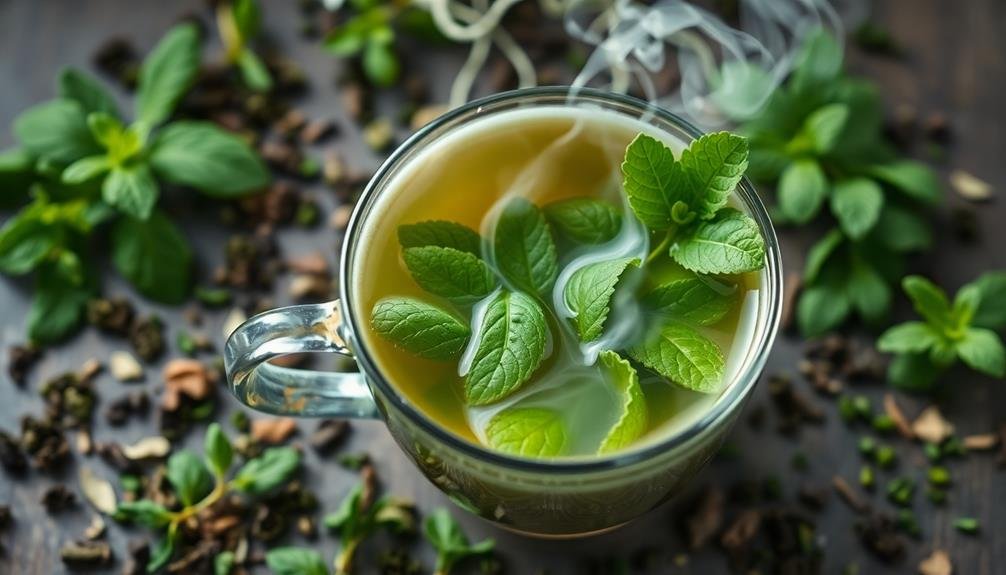
In the domain of herbal teas, mint reigns supreme with its invigorating zing. You'll find its revitalizing flavor cuts through other tastes, leaving your palate feeling clean and revitalized.
Peppermint and spearmint are the most common varieties, each offering a unique profile. Peppermint delivers a cool, crisp taste with a hint of sweetness, while spearmint provides a milder, slightly sweeter experience.
When you're mixing mint into your herbal tea blends, consider its potent nature. A little goes a long way, so start with a small amount and adjust to taste.
Mint pairs well with chamomile for a soothing nighttime brew, or with green tea for an energizing morning cup. It's also excellent for settling an upset stomach or easing digestion after a heavy meal.
Don't limit yourself to dried mint leaves; fresh mint can add an extra layer of aroma and flavor. Simply crush a few leaves before adding them to your tea.
Lemon Zest's Citrus Burst
Ever wondered how to add a zesty kick to your herbal tea? Search no further than lemon zest! This citrus powerhouse brings a burst of flavor and aroma to your brew, elevating it from ordinary to extraordinary.
Lemon zest contains essential oils that pack a punch of citrusy goodness. When you add it to your tea, you'll experience a bright, revitalizing taste that awakens your senses. It's not just about flavor, though – lemon zest also offers potential health benefits, including vitamin C and antioxidants.
To incorporate lemon zest into your herbal tea, simply grate the outer peel of a fresh lemon using a fine grater or zester. Be careful to avoid the bitter white pith beneath. Start with a small amount and adjust to your taste preferences.
| Tea Type | Amount of Zest | Steeping Time |
|---|---|---|
| Green | 1/4 tsp | 2-3 minutes |
| Black | 1/2 tsp | 3-5 minutes |
| Herbal | 1/2 tsp | 5-7 minutes |
| White | 1/4 tsp | 1-3 minutes |
Experiment with combining lemon zest and other herbs like mint or ginger for a complex, invigorating flavor profile. You'll discover a whole new world of tea possibilities!
Rosemary's Herbal Essence
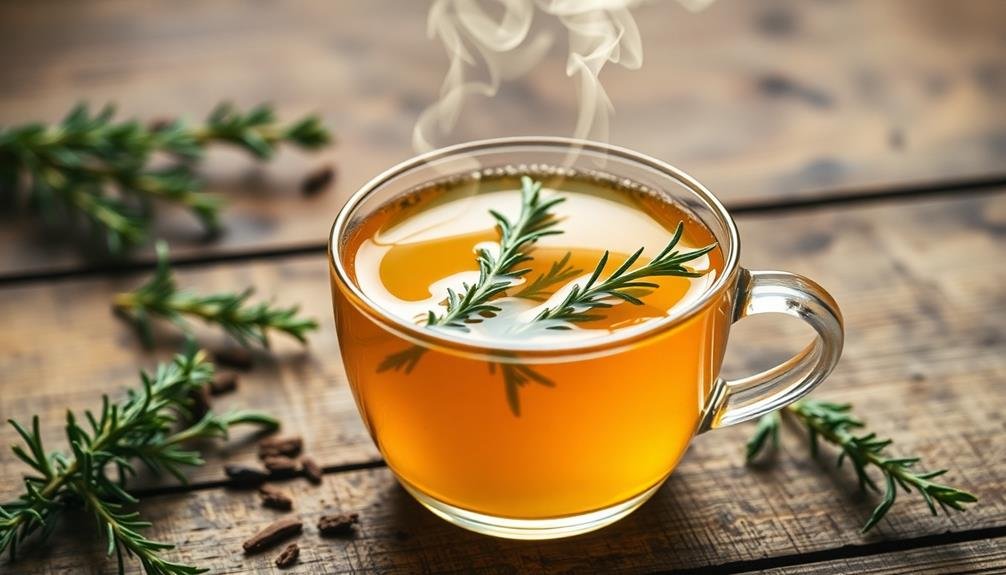
Rosemary's piney aroma can transform your herbal tea into a revitalizing and invigorating experience. This Mediterranean herb offers more than just a distinctive flavor; it brings a host of potential health benefits to your cup. When you add rosemary to your tea, you're infusing it with compounds that may improve digestion, enhance memory, and boost your immune system.
To incorporate rosemary into your herbal tea, start with a small sprig or a quarter teaspoon of dried leaves. Steep it alongside your chosen tea base for about 5 minutes. You'll notice the tea taking on a slightly woody, earthy taste with hints of mint and sage. Rosemary pairs exceptionally well with green tea, chamomile, or mint, creating a complex flavor profile that awakens your senses.
For an extra aromatic kick, try rubbing the rosemary leaves between your fingers before adding them to your tea. This releases more of the essential oils, intensifying the flavor and aroma.
Frequently Asked Questions
Can I Mix These Spices With Coffee Instead of Tea?
Yes, you can mix these spices with coffee instead of tea. It's a great way to add flavor and potential health benefits to your brew. Experiment with different combinations to find your perfect spiced coffee blend.
Are There Any Potential Side Effects of Consuming These Spice Blends?
You might experience digestive issues, allergic reactions, or interactions with medications when consuming spice blends. It's best to start with small amounts and consult your doctor if you're on medication or have health concerns.
How Long Do Homemade Spice Blends Typically Last?
Your homemade spice blends can typically last 6-12 months when stored properly. Keep them in airtight containers in a cool, dark place. You'll notice they're past their prime when the aroma and flavor start to fade.
Can I Use Dried Herbs Instead of Fresh Ones in These Blends?
Yes, you can use dried herbs in your spice blends. They're often more convenient and have a longer shelf life. Just remember that dried herbs are more concentrated, so you'll need to use less compared to fresh ones.
Are There Any Spices That Should Not Be Mixed Together?
You'll want to avoid mixing spices that clash in flavor or overpower each other. Generally, strong spices like cinnamon and clove shouldn't be combined with delicate ones like chamomile. It's best to experiment and find what works for your palate.
In Summary
You've now revealed a world of flavor possibilities for your herbal teas. By mixing these spices, you're not just enhancing taste but also boosting potential health benefits. Don't be afraid to experiment with different combinations to find your perfect blend. Remember, a pinch goes a long way. Whether you're seeking warmth, relaxation, or invigoration, there's a spice mix waiting to transform your daily cup. Embrace the adventure of spiced herbal teas!





Leave a Reply